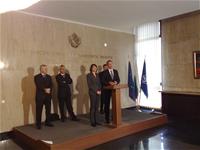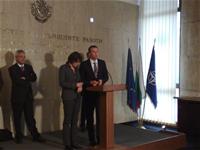The Western Balkans will be a major priority for Bulgaria's foreign policy
Adelina Marini, February 18, 2010
 Although yesterday there was no word about the second anniversary of Kosovo's independence, the new foreign minister of Bulgaria Nikolay Mladenov announced today that the region of the Western Balkans and the Black Sea would be a major priority for the Bulgarian foreign policy. He said this when he presented his new team. Asked by euinside why, if the Western Balkans were priority, yesterday Kosovo's anniversary was not marked in any way and whether the policy in the region will again be determined by the EU, Nikolay Mladenov replied:
Although yesterday there was no word about the second anniversary of Kosovo's independence, the new foreign minister of Bulgaria Nikolay Mladenov announced today that the region of the Western Balkans and the Black Sea would be a major priority for the Bulgarian foreign policy. He said this when he presented his new team. Asked by euinside why, if the Western Balkans were priority, yesterday Kosovo's anniversary was not marked in any way and whether the policy in the region will again be determined by the EU, Nikolay Mladenov replied:
"Bulgarian policy towards the region should always be in the context of the common European priorities, but this does not mean that we should not formulate our own priorities which we can realise bilaterally or through the instruments of European policies. In this case it would be a matter of judgement which way will be more effective. Our purpose from now on will be, first, to start a very cautious and detailed review of Bulgaria's relations with the countries from the Western Balkans as well as with the rest of the states in the region. And based upon this analysis, we will look for ways to solve specific problems which is obligatory if we want to realise our priorities".
Nikolay Mladenov gave as an example the fight with corruption and organised crime where Bulgaria is putting a lot of efforts. However, the same problem have many countries in the region and the transfer of corruption and crime through the borders in the Balkans is not a problem for a long time. This is why Mr Mladenov said this was good basis to find the most appropriate approach for cooperation with the countries surrounding Bulgaria so that the problems could be solved together. According to the minister, the European perspective of the countries of the Western Balkans would be s olution to a large part of their problems because this would force them to prepare and work in spirit of good neighbourhood.
He also recalled the idea of the prime minister Mr Boyko Borisov for joint sessions of the Greek and Bulgarian governments by adding that this idea could be extended to Romania too. The three countries, being neighbours and members of the EU, could cooperate in solving common and important problems. Especially, the Bulgarian foreign minister outlined infrastructure projects like Corridor No. 4 which will link the Danube river with the Greek city of Thessaloniki and the second bridge over Danube between Romania and Bulgaria, also known as Danube Bridge II.
Similar joint meetings among Bulgaria, Greece and Romania were held for the first time during the situation with Kosovo's independence when the foreign ministers of the three countries met to consider common actions and positions.
The new Bulgarian foreign minister sent a very important signal by saying that a full review will be made of all decisions, taken so far, for appointments and cuts of servants. Nikolay Mladenov refused to say directly whether his predecessor Rumyana Zheleva made wrong decisions but announced that the review would be made from the point of view of the expedience of those decisions.He assured all employees of the ministry and the embassies that he would not make any abrupt movements and that each case would be thoroughly analyzed.
One of the few things Rumyana Zheleva did as a foreign minister was to call back two ambassadors in key countries - the US and Turkey. At the moment the two countries, as well as Macedonia are left with no Bulgarian ambassador. Separately, the new team of the foreign ministry will make a full review of the structure of the ministry.
Mr.Mladenov once again underlined that foreign policy could be successful only if the internal policy was successful. He promised to make diplomacy more transparent by saying that the times of the Cold War had passed long time ago when important foreign policy decisions were taken by a small circle of people. Furthermore, the foreign minister assured that foreign policy would try to outrun business so as to facilitate its work. Bulgaria will also try to recover its relations with traditional partners in the past - North Africa and the Middle East.
Mladenov will restore one more thing, closed by Rumyana Zheleva - the directorates Australia and Oceania, Asia and Africa in the ministry which the former candidate for European Commissioner decided to close so as to cut spending and to realises the cuts the government asked for.
The new spokesperson of the ministry will be Vessela Tcherneva who until today chaired the  Sofia office of the European Council for Foreign Relations - a non-governmental organisations, created by former European politicians, experts and analysts, working on formulating ideas for Europe's foreign policy. She said today that for the last 20 years foreign policy has democratized and now it takes into account the opinion of society, the citizens and NGOs. This is why she promised to talk more to the media and the society, mainly about policies.
Sofia office of the European Council for Foreign Relations - a non-governmental organisations, created by former European politicians, experts and analysts, working on formulating ideas for Europe's foreign policy. She said today that for the last 20 years foreign policy has democratized and now it takes into account the opinion of society, the citizens and NGOs. This is why she promised to talk more to the media and the society, mainly about policies.
 Bakir Izetbegovic, Andrej Plenkovic | © Council of the EU
Bakir Izetbegovic, Andrej Plenkovic | © Council of the EU Aleksandar Vucic, Recep Tayyip Erdogan | © Serbian Presidency
Aleksandar Vucic, Recep Tayyip Erdogan | © Serbian Presidency Jean-Claude Juncker, Zoran Zaev | © European Commission
Jean-Claude Juncker, Zoran Zaev | © European Commission